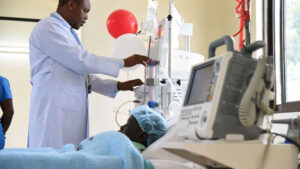As we reflect on the recent Africa Cup of Nations (AFCON) where Côte d’Ivoire triumphed over Nigeria, and as we mourn the loss of global champion Kelvin Kiptum Cheruiyot, it isimperative to recognize the profound impact sports can have on our nation’s trajectory.
As the former CEO of the 35th World Cross Country Championships held in Mombasa in 2007, I witnessed firsthand how sports can revolutionize an economy, instill positivity, and transform communities. Here are three pivotal lessons Kenya can learn to harness the potential of sports for unprecedented economic and social growth.
Firstly, the recent Africa Cup of Nations (AFCON) final demonstrated that success in sports is not just about population size but also about strategic planning and execution. For instance, Nigeria, with a population of around 200 million, was outplayed by Côte d’Ivoire, which has about 25 million people. Additionally, Cape Verde, a small island state with a population of roughly 600,000, reached the quarterfinals, showing that even nations with smaller populations can achieve great success in sports. This highlights the potential of sports to bring significant achievements to Kenya. To realize this potential, I suggest that Kenya should follow the example of Cape Verde by investing in robust sports infrastructure, coaching, and talent development programs that focus on quality rather than quantity.
Secondly, Kelvin Kiptum’s world record at 24 demonstrate that age is not a hindrance in sports. What truly matters is the steadfast focus and determination. Kenya possesses abundant youthful talent ready for cultivation. We must also fully tap into the global sports tourism market, estimated at around $600 billion. My great friend Lornah Kiplagat and her husband Pieter are already tapping into this through their High-Altitude Training Center in Iten, which attracts athletes and sports tourists globally. I urge the able Sports Cabinet Secretary AbabuNamwamba to consult widely and enact policies that will unlock the billions needed to replicate and upscale what Lornah and other sports personalities are doing across Kenya.
Thirdly, deliberately hosting local, regional, and global sporting events can create jobs and boost the economy. This was evident when Mombasa hosted the World Cross Country Championships in 2007. This event transformed the city’s economy, upgraded infrastructure like the Moi International Airport, road network, facelifted the Mama Ngina drive and the Mombasa Golf Club even as hotels were filled. The event also made Mombasa globally popular, attracting more visitors out of curiosity. Clearly, while not all sports require expensive infrastructure, we must develop world-class facilities and improve hotel capacity to succeed in this arena.
For sure, the financial potential of sports is evident in the earnings of top athletes. Forbes reported that in 2021, the world’s highest-paid athletes, such as Conor McGregor, Lionel Messi, and Cristiano Ronaldo, earned between $70 million and $180 million. By creating a supportive environment for sports, Kenya can develop talents who can compete at this level and bring significant economic benefits to the country. In Eldoret, there are numerous real estate developments and hospitality establishments owned by current and former athletes, demonstrating that investing in sporting talent can yield a substantial return on investment. I inspire investors to seriously consider investing in the systematic development of sporting talent.
In honor of our departed champion, President Ruto directed that a three-bedroom house be constructed within seven days ahead of his burial in Naiberi next Friday. This swift action embodies what Dr. Martin Luther King Jr. called ‘the fierce urgency of now.’ I encourage the sports fraternity to adopt this sense of urgency to transform sports into an economic pillar. I suggest that both the government and the private sector must take immediate action to move sports from the sidelines to the center of our economy.
I warmly urge policy makers to embark on the process of significantly increasing the budget for sports development in the coming year. Similarly, I encourage parents to support theiryouth to focus on sports as a viable career and business opportunity. Tusidharau michezo! Think green, act green!



